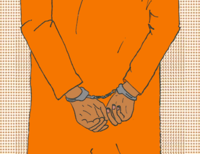Best investigative criminal justice journalism of 2014
As 2014 winds to a close, the Prison Policy Initiative recognizes the eight sorely needed investigative news stories that did the most to bring public attention to criminal justice reform.
by Peter Wagner and Bernadette Rabuy, December 22, 2014
As 2014 winds to a close, the Prison Policy Initiative wanted to recognize the eight sorely needed investigative news stories that did the most to bring public attention to criminal justice reform. In no particular order:
- Stop and Seize
by Michael Sallah, Robert O’Harrow Jr., Steven Rich
Washington Post
A 6-part series about how aggressive policing takes hundreds of millions of dollars from motorists not charged with crimes. - How municipalities in St. Louis County, Mo., profit from poverty
by Radley Balko
Washington Post
While the nation waited for the grand jury’s decision on whether to indict the officer who killed Michael Brown, Radley Balko explores the cycle of fines, fees and arrests in Ferguson and other St. Louis suburbs. - As Court Fees Rise, The Poor Are Paying The Price
by Joseph Shapiro
National Public Radio
An NPR investigative series finds an explosion in the use of fees charged to criminal defendants across the country, which has created a system of justice that targets the poor. - Prison bankers cash in on captive customers: Inmates’ families gouged by fees
by Daniel Wagner
Center for Public Integrity
In a groundbreaking article and 22 minute film, we have the first-ever exposé of JPay, the company that has come to dominate the market for sending money to incarcerated loved ones. - Debit cards slam released prisoners with sky-high fees, few protections: ‘They kept charging me every time I used it’
by Amirah Al Idrus
Center for Public Integrity
For more than a year, people have been asking the Prison Policy Initiative to look into the practice of correctional facilities requiring incarcerated people to take their release money — money earned via prison jobs and anything that loved ones sent in — not in cash or by check but on expensive high-fee debit cards. Despite the requests, we weren’t able to start this research, but Al Idrus has done the world a huge favor to be eclipsed only when federal or state regulators end the practice. - Unfair Punishment Part One: Victim Discrimination
by Sam Levin
East Bay Express
A California program that’s supposed to help crime victims rejects people who have had run-ins with the law. - Americans Don’t Know that Crime Rate Keeps Falling
by David Mendoza
The Mendoza Line
With a short article and an infographic, David Mendoza effectively explains the point that we’ve been trying to find a good way to say for 11 years: the public’s perception of crime rates has nothing at all to do with the actual rates of crime. - Ferguson, MO and Police Militarization
by John Oliver
Last Week Tonight with John Oliver
In the wake of the shooting of Michael Brown in Ferguson, MO, John Oliver explores the racial inequality in policing as well as the increasing militarization of America’s local police forces. In the second part of the piece, Oliver explains exactly why allowing the police to use surplus military equipment is a very dangerous idea for the future of our democracy.(Equally eloquent and a runner-up for this list of great investigative reporting was Oliver’s August segment on something Americans can’t get enough of: prisons. To Oliver, one of the key problems in our criminal justice system is the willful ignorance and indifference of the people running the system. As John Oliver points out, imprisonment is now so common that Sesame Street saw the need to create a puppet with an incarcerated parent; but the head of the Federal Bureau of Prisons doesn’t even know basic information like the size of the Bureau’s tortuous solitary confinement cells.)
Note: The purpose of this list is to highlight journalists who filled critical gaps in the public’s knowledge about criminal justice issues. To keep things fair, we excluded from consideration any articles that we are quoted in and articles that we consulted on in any way.



